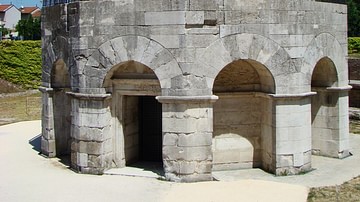Search
Search Results

Definition
Western Roman Empire
The Western Roman Empire is the modern-day term for the western half of the Roman Empire after it was divided in two by the emperor Diocletian (r. 284-305 CE) in c. 285/286 CE. The Romans themselves did not use this term. At its height (c...

Definition
Merovingian Dynasty
The Merovingian Dynasty was the ruling family of the Franks from roughly 481 when Clovis I ascended the throne of the Salian Franks until 751 when Childeric III was deposed and the Merovingians were supplanted by the Carolingian Dynasty as...

Definition
Ostrogoth
The Ostrogoths were the eastern tribe of the Goths (a Germanic people) who rose in power in the area north of the Black Sea. The designation, Ostrogoth, taken to mean 'Eastern Goth', actually means 'Goths glorified by the rising sun' and...

Definition
Augustine of Hippo
Aurelius Augustinus Hipponensis (354-430), better known as Augustine of Hippo, is extolled as the greatest of the Christian Church Fathers. More than any other writer, he developed what would become known as systematic theology, or an explanation...

Definition
Ptolemaic Egypt
Ptolemaic Egypt existed between 323 and 30 BCE when Egypt was ruled by the Macedonian Ptolemaic dynasty. During the Ptolemaic period, Egyptian society changed as Greek immigrants introduced a new language, religious pantheon, and way of life...

Definition
Roman Britain
Britain was a significant addition to the ever-expanding Roman Empire. For decades, Rome had been conquering the Mediterranean Sea – defeating Carthage in the Punic Wars, overwhelming Macedon and Greece, and finally marching into Syria and...

Definition
Zenobia
Zenobia (b. c. 240 CE, death date unknown) was the queen of the Palmyrene Empire who challenged the authority of Rome during the latter part of the period of Roman history known as The Crisis of the Third Century (235-284 CE also known as...

Definition
Varangian Guard - Bodyguard of the Byzantine Emperors
The mercenary Varangian Guard was an elite Byzantine army corps and the personal bodyguard of emperors beginning with Basil II in c. 988 CE. The Viking unit was famous for the stature of its members and their blood-thirsty conduct in battle...

Definition
Avars
The Avars were a confederation of heterogeneous (diverse or varied) people consisting of Rouran, Hephthalites, and Turkic-Oghuric races who migrated to the region of the Pontic Grass Steppe (an area corresponding to modern-day Ukraine, Russia...

Definition
Arminius
The Cherusci noble Arminius (c. 18 BCE - 19 CE) led the resistance to Roman conquest of Germania during the years 9-16 CE. Likely raised as a child hostage in Rome, Arminius gained command of a German auxiliary cohort in the Roman army. Posted...